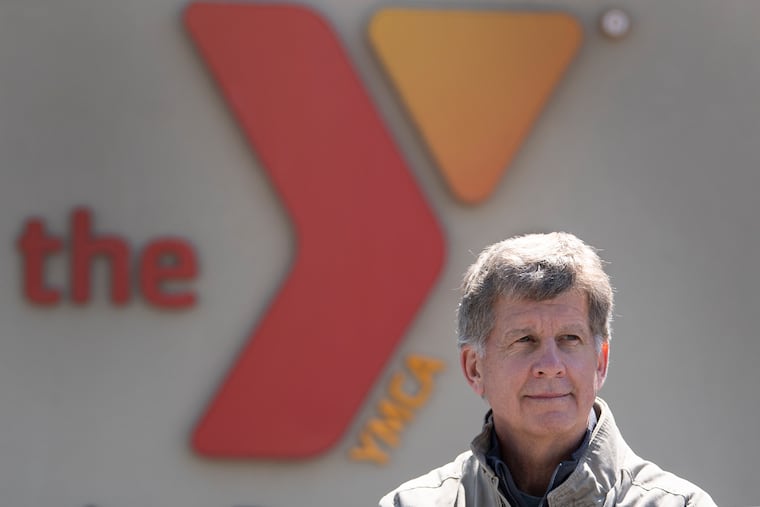Your YMCA is closed, burning cash, and wondering how to reopen in a COVID-safe way | Maria Panaritis
Before the coronavirus, the Greater Philadelphia YMCA network was rebuilt to pack more people into fewer branches. What to do now?

There was “silver lining” talk at first. The dark cloud being the fact that 4,400 Greater Philadelphia YMCA employees have been unemployed since the COVID-19 pandemic closed branches two months ago that had served a quarter of a million people in Southeastern Pennsylvania and South Jersey.
Senior citizens have been dialing into YMCA-led Zoom workouts to break their home-bound isolation. Other Zoom classes have caught on with gym rats left stranded by the coronavirus closures. And an emergency state lockdown waiver in Pennsylvania has allowed a smattering of child care for life-sustaining workers at otherwise shuttered Christian Street, Willow Grove, Rocky Run, Haverford, Northeast Philadelphia, and Phoenixville branches.
“We didn’t know we could do the things we are doing now two months ago,” CEO Shaun Elliott said a few days ago when I asked how things were going for the YMCA during this terrible time.
But when our talk shifted to money and the extraordinary logistics of one day reopening community centers that embody the polar opposite of social distancing, that silver bled into gray.
The YMCA, Elliott said, has made financial adjustments. With help from its bankers and vendors, it can “limp” into 2021. But real worry about its survival will take hold months before that.
“If we’re not open and up and running by the fall,” he said, “it’ll be an existential issue.”
The question is, how do you reopen the YMCA at a time of social distancing? Especially an organization that rebuilt itself in recent years to very specifically operate with very high numbers of members.
Before the coronavirus, our local offshoot of the 175-year-old London-founded institution had worked hard to offload old branches and build newer, fewer ones, to become a high-volume, high-efficiency operation.
By packing more members into fewer branches, the hope was to lessen the need for charitable giving. You generate enough cash from members, pay less for overhead with fewer buildings, and suddenly there’s enough money also to offer subsidies to low-income members across the network.
In a global pandemic without a vaccine or treatment for lethal and highly contagious COVID-19, you can see the YMCA’s challenge moving forward.
Workout rooms full of sweaty mats, overcrowded swimming pool decks, full day camps with children, and treadmills six inches apart are not going to cut it if and when Govs. Tom Wolf and Phil Murphy allow reopenings in Pennsylvania and New Jersey.
The Y is mapping out possibilities.
“In the case of day camp we’ll be operating in a model of one staff per nine, no more than 10 people in a group,” Elliott said. “We’ll keep each group isolated from the other group. For swim lessons, the pool is easier to manage than the deck. The good news is chlorine kills the virus. The challenge will be keeping people socially distant on the deck.”
All of this and with a cash crunch, too.
The YMCA has secured a six-month deferment on debt payments from its banks. Federal and state coronavirus rescue measures also allowed for help to cover the nonprofit’s share of costly unemployment insurance payouts. All but about 80 of its employees are laid off or furloughed. The CEO is taking no salary; his support staff, pay cuts.
Even so, the $100 million organization is burning through cash.
Before stay-home orders that shut down all but life-sustaining businesses in March, the YMCA had 190,000 members. It served an additional 30,000 to 40,000 people with day camp, child-care centers, after-school programs, and other community programs at 16 branches, 100 after-school locations, 13 full-day child care centers, and several dozen other locations.
With only a small percentage of members still paying dues, the YMCA is taking in just $500,000 a month while still paying out $4.5 million in monthly expenses, Elliott said.
Even the emergency child-care program for frontline workers, begun six weeks ago, is not paying for itself.
The “key question” for when they do reopen is how to do so safely. And whether it will be at a high enough capacity to bring back all the staff they previously had.
The child-care program has taught them how to do some COVID basics: Take temperatures, question people, and register them upon entrance and exit. The YMCA has bought hundreds of thermometers for opening day everywhere.
“When we are ready to reopen, even if we talk about summer day camp which may take the form of child care for many parents as they try to go back to work, we’ve already got the protocols,” he said. “We’ve been working with the CDC, American Camping Association, and the public health unit in Philadelphia. ... We will screen everybody.”
They will also be spacing out equipment -- something tricky for its largest five branches by membership, in descending order: Haverford (27,000), Rocky Run, Spring Valley, Willow Grove, and Phoenixville (15,000).
There’s also a stash of special disinfecting equipment now on hand.
“We can fog a building now in five hours,” he said. “After hours, we can go into a building and deep-clean it using a fogging machine, in addition to typical cleaning methods.”
All of this, of course, is brand new. But untested. And time is ticking while cash burns and the lights stay out.
“I’m confident in our ability to adapt,” Elliott added. “Having said that, I’d be silly not to be worried.”